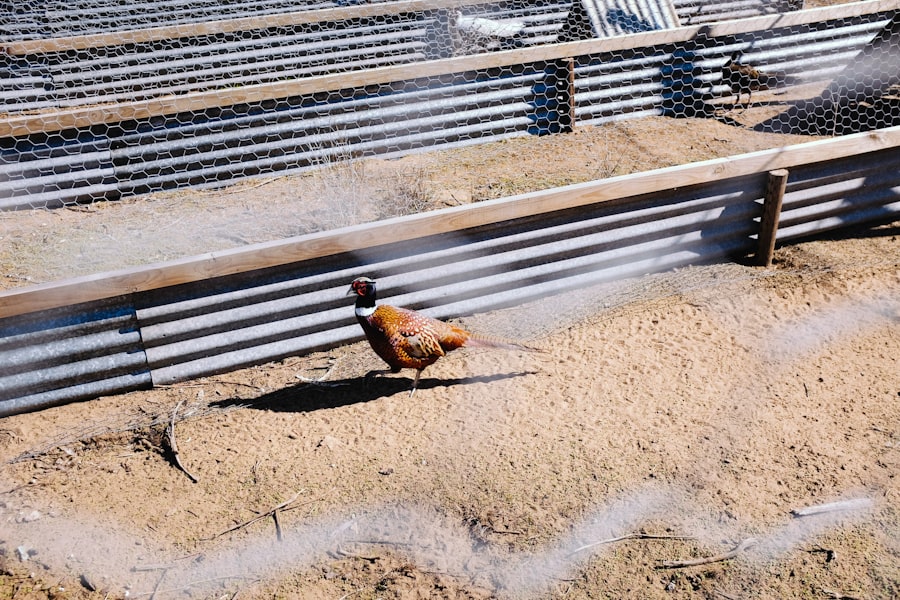Chickens are naturally curious and social animals with a strong instinct to forage for food. This behavior can lead them to wander into areas where they are not supposed to be, such as gardens or flower beds. Understanding chicken behavior is crucial for finding effective ways to keep them out of unwanted areas.
Chickens are easily startled by sudden movements or loud noises, which can be used advantageously when implementing scare tactics to deter them. They also have a natural aversion to certain scents and tastes, which can be utilized when using natural deterrents to keep them away from specific areas. Chickens are creatures of habit and will often return to the same areas if they have found a good source of food or shelter there.
This means that regular maintenance and monitoring of potential entry points is essential in preventing chickens from accessing unwanted areas. By understanding chicken behavior, a comprehensive strategy can be developed for keeping them out of specific areas while still allowing them to roam freely in designated spaces.
Table of Contents
- 1 Building a Physical Barrier
- 2 Using Natural Deterrents
- 3 Implementing Scare Tactics
- 4 Creating a Separate Space for Chickens
- 5 Regular Maintenance and Monitoring
- 6 Seeking Professional Advice
- 7 FAQs
- 7.1 What are some effective ways to keep chickens out of raised garden beds?
- 7.2 Why is it important to keep chickens out of raised garden beds?
- 7.3 What are some common plants that chickens are attracted to in raised garden beds?
- 7.4 Are there any plants that can repel chickens from raised garden beds?
- 7.5 How can I protect my raised garden beds from chickens without harming them?
Key Takeaways
- Chickens are naturally curious and can be easily scared by sudden movements or loud noises
- Building a physical barrier such as a fence can help keep chickens safe from predators
- Natural deterrents like planting thorny bushes or using strong-smelling herbs can discourage predators from approaching the chicken coop
- Scare tactics like motion-activated lights or sprinkler systems can startle predators and keep them away from the chickens
- Creating a separate space for chickens to roam during the day can help minimize their exposure to potential predators
- Regular maintenance of the chicken coop and monitoring for any signs of predator activity is essential for keeping chickens safe
- Seeking professional advice from a local veterinarian or animal control expert can provide valuable insights on predator prevention and chicken safety
Building a Physical Barrier
Key Considerations for Building a Physical Barrier
When building a physical barrier, it is important to ensure that it is tall enough to prevent chickens from flying or jumping over it. Additionally, the barrier should be securely anchored to the ground to prevent chickens from digging underneath it.
Alternative Methods for Keeping Chickens Out
Another option for building a physical barrier is to use raised garden beds or elevated planters to keep chickens away from delicate plants and flowers.
The Benefits of Physical Barriers
By creating a physical barrier, we can effectively prevent chickens from accessing areas where they are not supposed to be, while still allowing them to roam freely in other parts of the yard.
Using Natural Deterrents
Natural deterrents can be an effective way to keep chickens out of unwanted areas without causing them harm. Chickens have a natural aversion to certain scents and tastes, which can be used to our advantage when trying to deter them from specific areas. For example, sprinkling cayenne pepper or garlic powder around plants and flowers can help keep chickens away, as they do not like the strong smell or taste.
Additionally, planting herbs such as lavender, mint, or rosemary around the perimeter of a garden can help deter chickens from entering the area. Another natural deterrent that can be used is predator urine, which can be purchased at garden supply stores. The scent of predator urine can help keep chickens away from specific areas, as they will instinctively avoid places where predators may be present.
By using natural deterrents, we can effectively keep chickens out of unwanted areas while still allowing them to roam freely in other parts of the yard.
Implementing Scare Tactics
Scare tactics can be an effective way to deter chickens from accessing unwanted areas. Chickens are easily startled by sudden movements or loud noises, which can be used to our advantage when trying to keep them away from specific areas. For example, hanging shiny objects such as aluminum foil strips or old CDs around plants and flowers can create movement and reflection that will startle chickens and keep them away.
Additionally, using motion-activated sprinklers or noise-making devices can help scare chickens away from specific areas. Another scare tactic that can be used is the presence of a scarecrow or other large, intimidating figures. Chickens are naturally wary of unfamiliar objects, and the presence of a scarecrow can help keep them away from specific areas.
By implementing scare tactics, we can effectively deter chickens from accessing unwanted areas while still allowing them to roam freely in other parts of the yard.
Creating a Separate Space for Chickens
Creating a separate space for chickens to roam freely can help prevent them from accessing unwanted areas in the yard. This can be done by designating a specific area for chickens to forage and providing them with plenty of food, water, and shelter in that space. By creating a separate space for chickens, we can ensure that they have everything they need without needing to venture into other parts of the yard.
Another option for creating a separate space for chickens is to use portable fencing or chicken wire to create a temporary enclosure that can be moved around as needed. This allows chickens to have access to different areas of the yard while still preventing them from accessing unwanted areas. By creating a separate space for chickens, we can effectively keep them out of specific areas while still allowing them to roam freely in other parts of the yard.
Regular Maintenance and Monitoring

Inspecting Fencing and Netting
Regularly inspecting fencing and netting is essential to ensure that they are secure and do not have any gaps or openings that chickens can exploit.
Securing Raised Garden Beds and Elevated Planters
Additionally, it is important to regularly inspect raised garden beds or elevated planters to ensure that they are secure and not easily accessible to chickens.
Monitoring Chicken Behavior
Monitoring the behavior of chickens and observing their patterns can also help identify potential entry points and areas of concern. By regularly maintaining and monitoring potential entry points, we can effectively prevent chickens from accessing unwanted areas while still allowing them to roam freely in other parts of the yard.
Seeking Professional Advice
If all else fails, seeking professional advice from a veterinarian or animal behaviorist can provide valuable insight into effective ways to keep chickens out of unwanted areas. These professionals can offer guidance on behavior modification techniques, as well as recommend specific products or methods for deterring chickens from specific areas. Additionally, seeking professional advice can help identify any underlying issues that may be contributing to the behavior of chickens accessing unwanted areas.
By seeking professional advice, we can gain a better understanding of the behavior of chickens and develop a comprehensive strategy for keeping them out of specific areas while still allowing them to roam freely in other parts of the yard. In conclusion, understanding the behavior of chickens is crucial in finding effective ways to keep them out of unwanted areas. Building a physical barrier, using natural deterrents, implementing scare tactics, creating a separate space for chickens, regular maintenance and monitoring, and seeking professional advice are all important strategies for keeping chickens out of specific areas while still allowing them to roam freely in other parts of the yard.
By utilizing these strategies, we can effectively prevent chickens from accessing unwanted areas and ensure that they have everything they need in designated spaces.
If you’re looking for more tips on keeping chickens, you might want to check out this article on 10 essential features for a chicken coop. It provides valuable information on creating a safe and comfortable environment for your feathered friends.
FAQs
What are some effective ways to keep chickens out of raised garden beds?
Some effective ways to keep chickens out of raised garden beds include using physical barriers such as chicken wire or fencing, using natural deterrents like citrus peels or coffee grounds, and providing alternative areas for the chickens to forage.
Why is it important to keep chickens out of raised garden beds?
It is important to keep chickens out of raised garden beds because they can cause damage to plants, disturb the soil, and potentially spread diseases or parasites.
What are some common plants that chickens are attracted to in raised garden beds?
Chickens are often attracted to leafy greens, herbs, and small fruits such as strawberries in raised garden beds.
Are there any plants that can repel chickens from raised garden beds?
Plants such as marigolds, lavender, and rosemary are known to have repellent properties that can help keep chickens away from raised garden beds.
How can I protect my raised garden beds from chickens without harming them?
You can protect your raised garden beds from chickens without harming them by using non-toxic deterrents, providing alternative foraging areas, and using physical barriers that prevent access without causing harm to the chickens.
Meet Walter, the feathered-friend fanatic of Florida! Nestled in the sunshine state, Walter struts through life with his feathered companions, clucking his way to happiness. With a coop that’s fancier than a five-star hotel, he’s the Don Juan of the chicken world. When he’s not teaching his hens to do the cha-cha, you’ll find him in a heated debate with his prized rooster, Sir Clucks-a-Lot. Walter’s poultry passion is no yolk; he’s the sunny-side-up guy you never knew you needed in your flock of friends!







